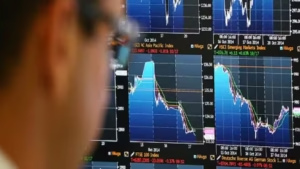Shares of Bajaj Finance hit a record high on Thursday after the non-banking financial company (NBFC) announced that its board of directors would meet on 29 April 2025 to discuss several key proposals. These proposals include an interim dividend, a stock split, and a bonus share issue, in addition to reviewing the earnings for the March quarter and the fiscal year.
In early trading, Bajaj Finance’s stock reached a fresh all-time high of Rs 9,709.75, surpassing the previous close of Rs 9,326.25 on the Bombay Stock Exchange (BSE). On April 22, the stock had previously touched a high of Rs 9,391.15, but on April 23, it peaked at Rs 9,340. A total of 0.74 lakh shares of the company were traded, with a turnover of Rs 69.36 crore on Thursday. Over the past year, the stock has gained 26.62%, and in the last two years, it has risen by 57%.
The Relative Strength Index (RSI) of Bajaj Finance’s stock currently stands at 65.8, indicating that it is neither oversold nor overbought on the charts. An RSI level below 30 is considered oversold, while a value above 70 is viewed as overbought. The stock is trading higher than its 5-day, 10-day, 20-day, 30-day, 50-day, 100-day, 150-day, and 200-day moving averages.
Bajaj Finance’s one-year beta is 1.1, suggesting high volatility in its stock price during this period.
The company stated, “We hereby inform that additionally, the Board of Directors of the Company, at their meeting scheduled on 29 April 2025, will consider, inter-alia, the following:
- Special (Interim) Dividend for Financial Year 2024-25.
- Subject to approval of shareholders:
a. Proposal for sub-division/split of existing equity shares with a face value of Rs. 2 each, in accordance with the applicable provisions of the Companies Act, 2013 (including the rules framed thereunder) and SEBI Listing Regulations, 2015; and
b. Proposal for the issue of bonus shares, in accordance with the applicable provisions of the Companies Act, 2013 (including the rules framed thereunder), and the Securities and Exchange Board of India (Issue of Capital and Disclosure Requirements) Regulations, 2018.”







